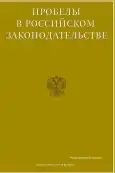Limits of Financial and Legal Regulation of Certain Types of Digital Relations
- Authors: Savina A.V.1
-
Affiliations:
- Tambov State University named after G.R. Derzhavin
- Issue: Vol 16, No 2 (2023)
- Pages: 182-186
- Section: Private Law (Civil) Sciences
- URL: https://bakhtiniada.ru/2072-3164/article/view/250266
- ID: 250266
Cite item
Abstract
The purpose of the study. The needs associated with the implementation of various kinds of transactions, the formation of a system of continuous earnings and passive income, the manifestation of personal qualities on the Internet are continuously being formed in society. Technologies determine the processes of transformation of monetary relations. The exchange of goods, works and services is increasingly taking place in the virtual space, which leads to the need for a state response to such processes and the adoption of existing legal norms, the introduction of various settlement tools, the formation of a digital financial ecosystem. Any innovations accompanied by legal tools cannot manifest themselves in an absolutely free form. For effective management, the state is forced to establish various frameworks in which the participants of various public relations are supposed to carry out activities, including financial relations of an innovative type. The article analyzes the issues of circulation of digital currency and digital financial assets. The author conducts a comparative analysis of the concepts of digital currency and national digital currency (in particular, the digital ruble), concluding about their significant differences. The signs of digital currency and digital financial assets are investigated. Attention is paid to changes in legislation that are somehow related to digital currency and digital financial assets. The article also conducts research on the limits of legal regulation of relations related to the issuance and circulation of digital currency, digital financial assets. Conclusions. The author notes that the distinctions in the conceptual apparatus of digital economic relations are becoming increasingly valuable in the formulation of legislative provisions. At the same time, the paper emphasizes that it is necessary to establish a clear division of powers of the Bank of Russia with government authorities implementing programs to optimize digital infrastructure, introduce new innovative elements into socio-economic relations, as well as law enforcement agencies tasked with protecting public interests and preventing illegal circulation of digital currencies and digital financial assets in the for selfish purposes of an illegal nature.
Full Text
##article.viewOnOriginalSite##About the authors
Anna V. Savina
Tambov State University named after G.R. Derzhavin
Author for correspondence.
Email: anna.savina56@mail.ru
Cand.Sci.(Law), Associate Professor of the Department of Civil Law
Russian Federation, TambovReferences
- Alexandrova N.S. Correlation of the concepts of «digital rights», «digital currency» and «digital financial asset» // Bulletin of the Moscow University of the Ministry of Internal Affairs of Russia. 2021. No. 6. pp. 28-31.
- Alekseev N.V. Correlation of institutions of digital rights, digital financial assets and digital currencies // Bulletin of the Voronezh State University. Series: Law. 2022. No. 1 (48). pp. 180-190.
- Voskresenskaya L.N., Startseva A.R. Does Russia need its own digital currency (environmental, social, governance) // Bulletin of the Tula branch of the Financial University. 2022. No. 1. pp. 79-81.
- Diakonov R.V. Prospects for the introduction of a digital currency of the central bank in the world and in Russia // Management issues. 2023. No. 1 (80). pp. 5-18.
- Kalacheva M.S. Digital Ruble - Countering counterfeiting by the Bank of Russia // Bulletin of the Moscow University of the Ministry of Internal Affairs of Russia. 2022. No. 2. pp. 97-100.
- Kashin M.S. The security of using digital currency and ways to increase it // Via scientiarum - The Road of Knowledge. 2022. No. 2. pp. 37-42.
- Sadkov V.A. On the dualism of understanding the categories of «digital rights» and «digital financial assets» // The Power of Law. 2020. No. 4 (44). pp. 188-196.
- Tregubov V.S. Some problems of legal regulation of digital financial assets and digital currencies in the Russian Federation // State and Law. Materials of the 59th International Scientific Student Conference. Novosibirsk, 2021. pp. 175-176.
- Shaker I.E. Risk analysis of the central bank’s digital currency in the new financial ecosystem // Banking Services. 2018. No. 11. pp. 9-19. pp.17.
- Yakovleva-Chernysheva A.Yu. Money as objects of civil rights in the conditions of digitalization of the economy // Bulletin of the Russian Law Academy. 2022. No. 2. pp. 64-70.
Supplementary files








